Op-Ed: Impact of Overworked Medical and Hospital Staff Globally
VerifiedAdded on 2022/11/24
|6
|1193
|456
Report
AI Summary
This report, presented as an Op-Ed, critically analyzes the challenges associated with overworked medical and hospital staff, focusing on the Australian healthcare system and its global implications. The author explores how increased workloads, staff shortages, and inadequate compensation contribute to burnout, reduced patient care quality, and ethical concerns related to the common good. The analysis highlights the impact on both healthcare professionals and patients, emphasizing the need for improved working conditions, fair compensation, and strategies to address the imbalance between patient numbers and available staff. The report references several studies and articles to support its arguments, emphasizing the need for a more sustainable and ethical approach to healthcare management to uphold the dignity and well-being of both staff and patients.
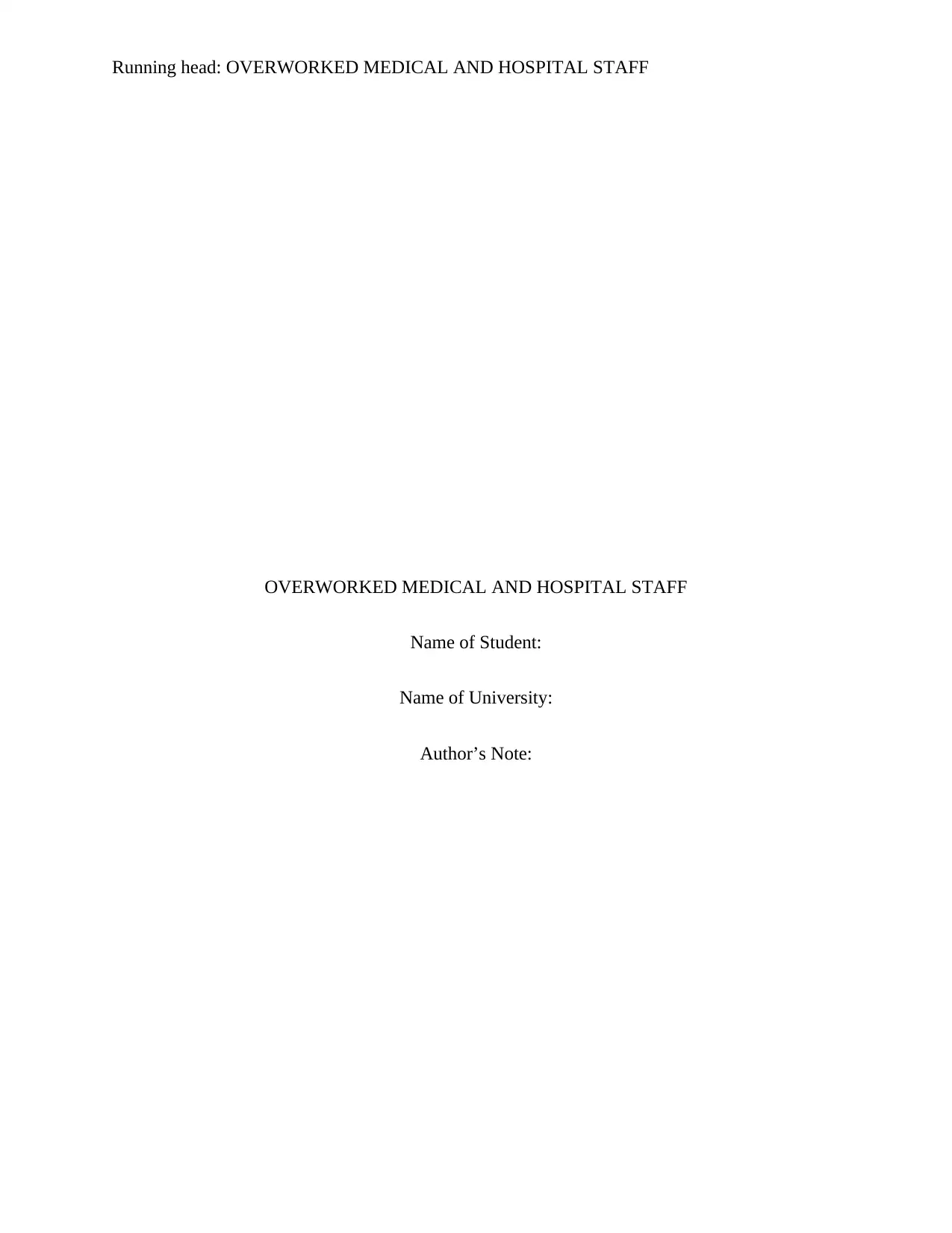
Running head: OVERWORKED MEDICAL AND HOSPITAL STAFF
OVERWORKED MEDICAL AND HOSPITAL STAFF
Name of Student:
Name of University:
Author’s Note:
OVERWORKED MEDICAL AND HOSPITAL STAFF
Name of Student:
Name of University:
Author’s Note:
Paraphrase This Document
Need a fresh take? Get an instant paraphrase of this document with our AI Paraphraser
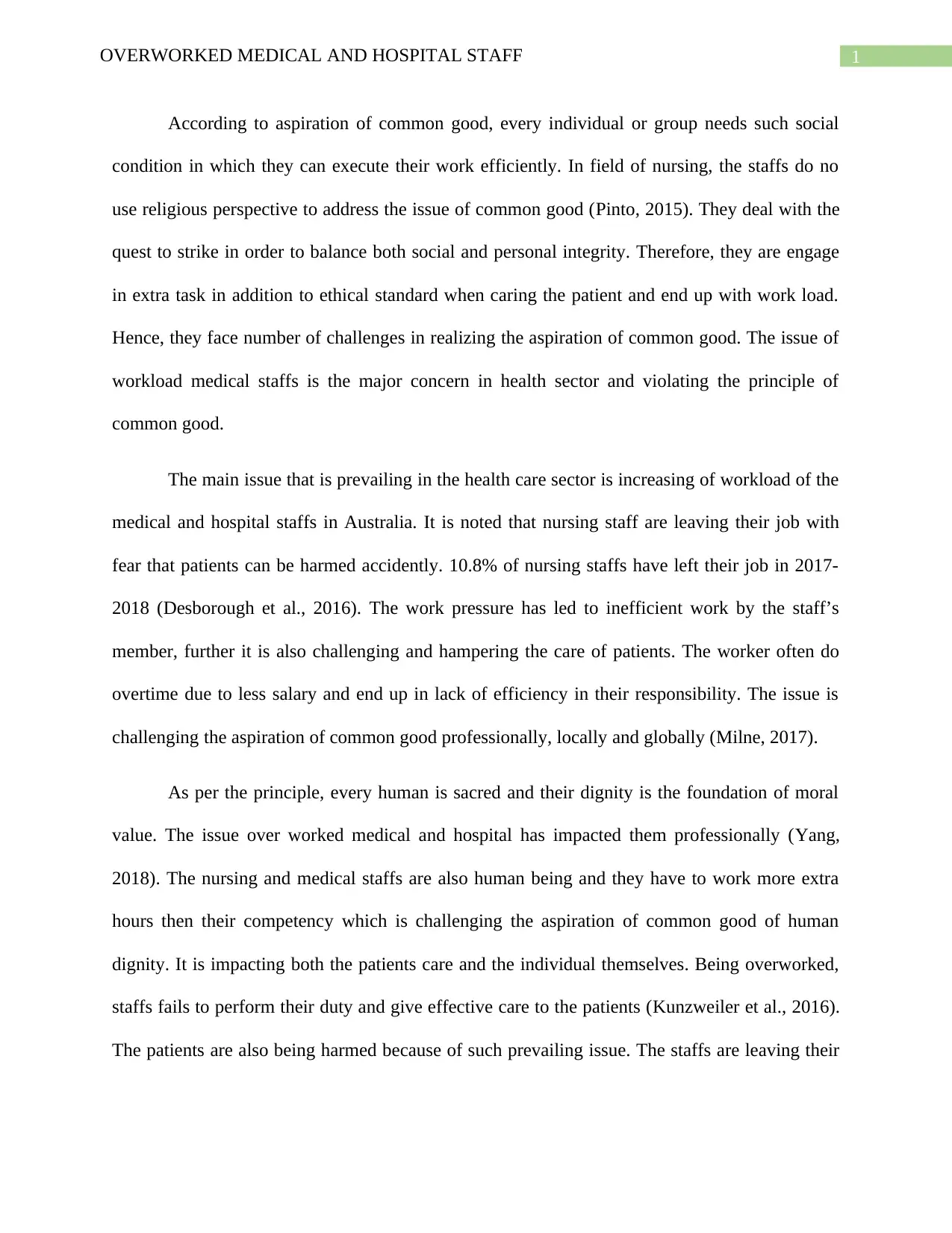
1OVERWORKED MEDICAL AND HOSPITAL STAFF
According to aspiration of common good, every individual or group needs such social
condition in which they can execute their work efficiently. In field of nursing, the staffs do no
use religious perspective to address the issue of common good (Pinto, 2015). They deal with the
quest to strike in order to balance both social and personal integrity. Therefore, they are engage
in extra task in addition to ethical standard when caring the patient and end up with work load.
Hence, they face number of challenges in realizing the aspiration of common good. The issue of
workload medical staffs is the major concern in health sector and violating the principle of
common good.
The main issue that is prevailing in the health care sector is increasing of workload of the
medical and hospital staffs in Australia. It is noted that nursing staff are leaving their job with
fear that patients can be harmed accidently. 10.8% of nursing staffs have left their job in 2017-
2018 (Desborough et al., 2016). The work pressure has led to inefficient work by the staff’s
member, further it is also challenging and hampering the care of patients. The worker often do
overtime due to less salary and end up in lack of efficiency in their responsibility. The issue is
challenging the aspiration of common good professionally, locally and globally (Milne, 2017).
As per the principle, every human is sacred and their dignity is the foundation of moral
value. The issue over worked medical and hospital has impacted them professionally (Yang,
2018). The nursing and medical staffs are also human being and they have to work more extra
hours then their competency which is challenging the aspiration of common good of human
dignity. It is impacting both the patients care and the individual themselves. Being overworked,
staffs fails to perform their duty and give effective care to the patients (Kunzweiler et al., 2016).
The patients are also being harmed because of such prevailing issue. The staffs are leaving their
According to aspiration of common good, every individual or group needs such social
condition in which they can execute their work efficiently. In field of nursing, the staffs do no
use religious perspective to address the issue of common good (Pinto, 2015). They deal with the
quest to strike in order to balance both social and personal integrity. Therefore, they are engage
in extra task in addition to ethical standard when caring the patient and end up with work load.
Hence, they face number of challenges in realizing the aspiration of common good. The issue of
workload medical staffs is the major concern in health sector and violating the principle of
common good.
The main issue that is prevailing in the health care sector is increasing of workload of the
medical and hospital staffs in Australia. It is noted that nursing staff are leaving their job with
fear that patients can be harmed accidently. 10.8% of nursing staffs have left their job in 2017-
2018 (Desborough et al., 2016). The work pressure has led to inefficient work by the staff’s
member, further it is also challenging and hampering the care of patients. The worker often do
overtime due to less salary and end up in lack of efficiency in their responsibility. The issue is
challenging the aspiration of common good professionally, locally and globally (Milne, 2017).
As per the principle, every human is sacred and their dignity is the foundation of moral
value. The issue over worked medical and hospital has impacted them professionally (Yang,
2018). The nursing and medical staffs are also human being and they have to work more extra
hours then their competency which is challenging the aspiration of common good of human
dignity. It is impacting both the patients care and the individual themselves. Being overworked,
staffs fails to perform their duty and give effective care to the patients (Kunzweiler et al., 2016).
The patients are also being harmed because of such prevailing issue. The staffs are leaving their
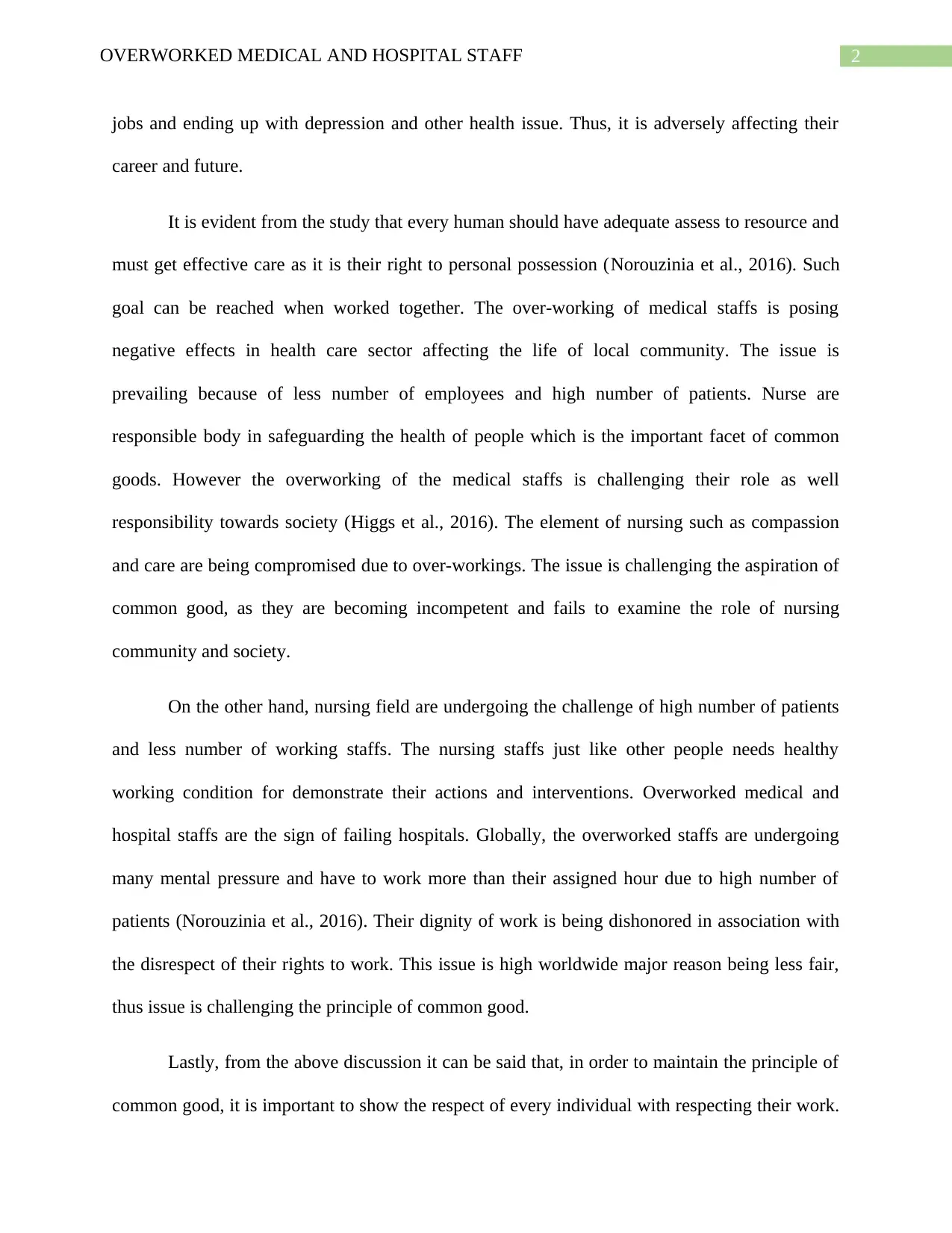
2OVERWORKED MEDICAL AND HOSPITAL STAFF
jobs and ending up with depression and other health issue. Thus, it is adversely affecting their
career and future.
It is evident from the study that every human should have adequate assess to resource and
must get effective care as it is their right to personal possession (Norouzinia et al., 2016). Such
goal can be reached when worked together. The over-working of medical staffs is posing
negative effects in health care sector affecting the life of local community. The issue is
prevailing because of less number of employees and high number of patients. Nurse are
responsible body in safeguarding the health of people which is the important facet of common
goods. However the overworking of the medical staffs is challenging their role as well
responsibility towards society (Higgs et al., 2016). The element of nursing such as compassion
and care are being compromised due to over-workings. The issue is challenging the aspiration of
common good, as they are becoming incompetent and fails to examine the role of nursing
community and society.
On the other hand, nursing field are undergoing the challenge of high number of patients
and less number of working staffs. The nursing staffs just like other people needs healthy
working condition for demonstrate their actions and interventions. Overworked medical and
hospital staffs are the sign of failing hospitals. Globally, the overworked staffs are undergoing
many mental pressure and have to work more than their assigned hour due to high number of
patients (Norouzinia et al., 2016). Their dignity of work is being dishonored in association with
the disrespect of their rights to work. This issue is high worldwide major reason being less fair,
thus issue is challenging the principle of common good.
Lastly, from the above discussion it can be said that, in order to maintain the principle of
common good, it is important to show the respect of every individual with respecting their work.
jobs and ending up with depression and other health issue. Thus, it is adversely affecting their
career and future.
It is evident from the study that every human should have adequate assess to resource and
must get effective care as it is their right to personal possession (Norouzinia et al., 2016). Such
goal can be reached when worked together. The over-working of medical staffs is posing
negative effects in health care sector affecting the life of local community. The issue is
prevailing because of less number of employees and high number of patients. Nurse are
responsible body in safeguarding the health of people which is the important facet of common
goods. However the overworking of the medical staffs is challenging their role as well
responsibility towards society (Higgs et al., 2016). The element of nursing such as compassion
and care are being compromised due to over-workings. The issue is challenging the aspiration of
common good, as they are becoming incompetent and fails to examine the role of nursing
community and society.
On the other hand, nursing field are undergoing the challenge of high number of patients
and less number of working staffs. The nursing staffs just like other people needs healthy
working condition for demonstrate their actions and interventions. Overworked medical and
hospital staffs are the sign of failing hospitals. Globally, the overworked staffs are undergoing
many mental pressure and have to work more than their assigned hour due to high number of
patients (Norouzinia et al., 2016). Their dignity of work is being dishonored in association with
the disrespect of their rights to work. This issue is high worldwide major reason being less fair,
thus issue is challenging the principle of common good.
Lastly, from the above discussion it can be said that, in order to maintain the principle of
common good, it is important to show the respect of every individual with respecting their work.
⊘ This is a preview!⊘
Do you want full access?
Subscribe today to unlock all pages.

Trusted by 1+ million students worldwide
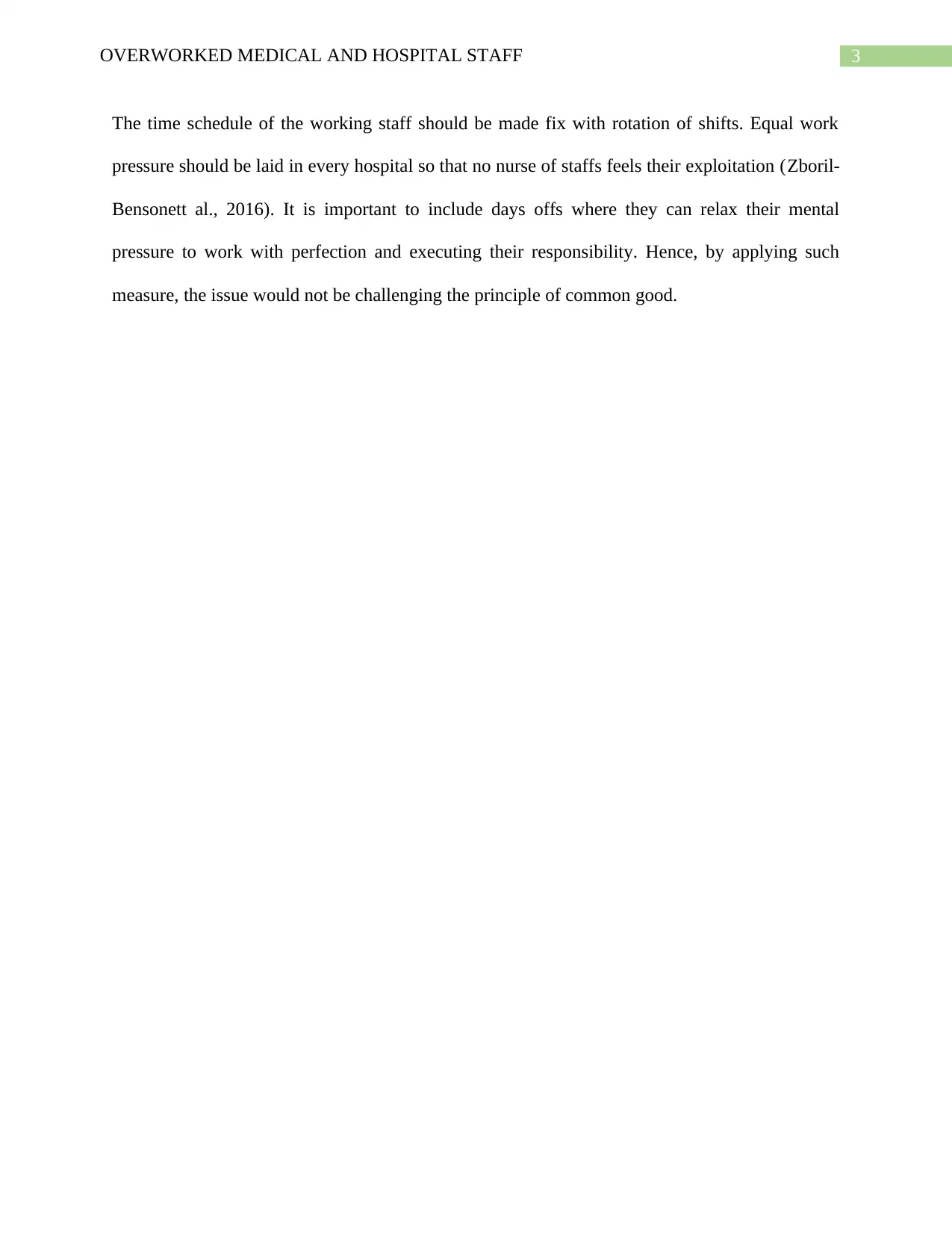
3OVERWORKED MEDICAL AND HOSPITAL STAFF
The time schedule of the working staff should be made fix with rotation of shifts. Equal work
pressure should be laid in every hospital so that no nurse of staffs feels their exploitation (Zboril-
Bensonett al., 2016). It is important to include days offs where they can relax their mental
pressure to work with perfection and executing their responsibility. Hence, by applying such
measure, the issue would not be challenging the principle of common good.
The time schedule of the working staff should be made fix with rotation of shifts. Equal work
pressure should be laid in every hospital so that no nurse of staffs feels their exploitation (Zboril-
Bensonett al., 2016). It is important to include days offs where they can relax their mental
pressure to work with perfection and executing their responsibility. Hence, by applying such
measure, the issue would not be challenging the principle of common good.
Paraphrase This Document
Need a fresh take? Get an instant paraphrase of this document with our AI Paraphraser
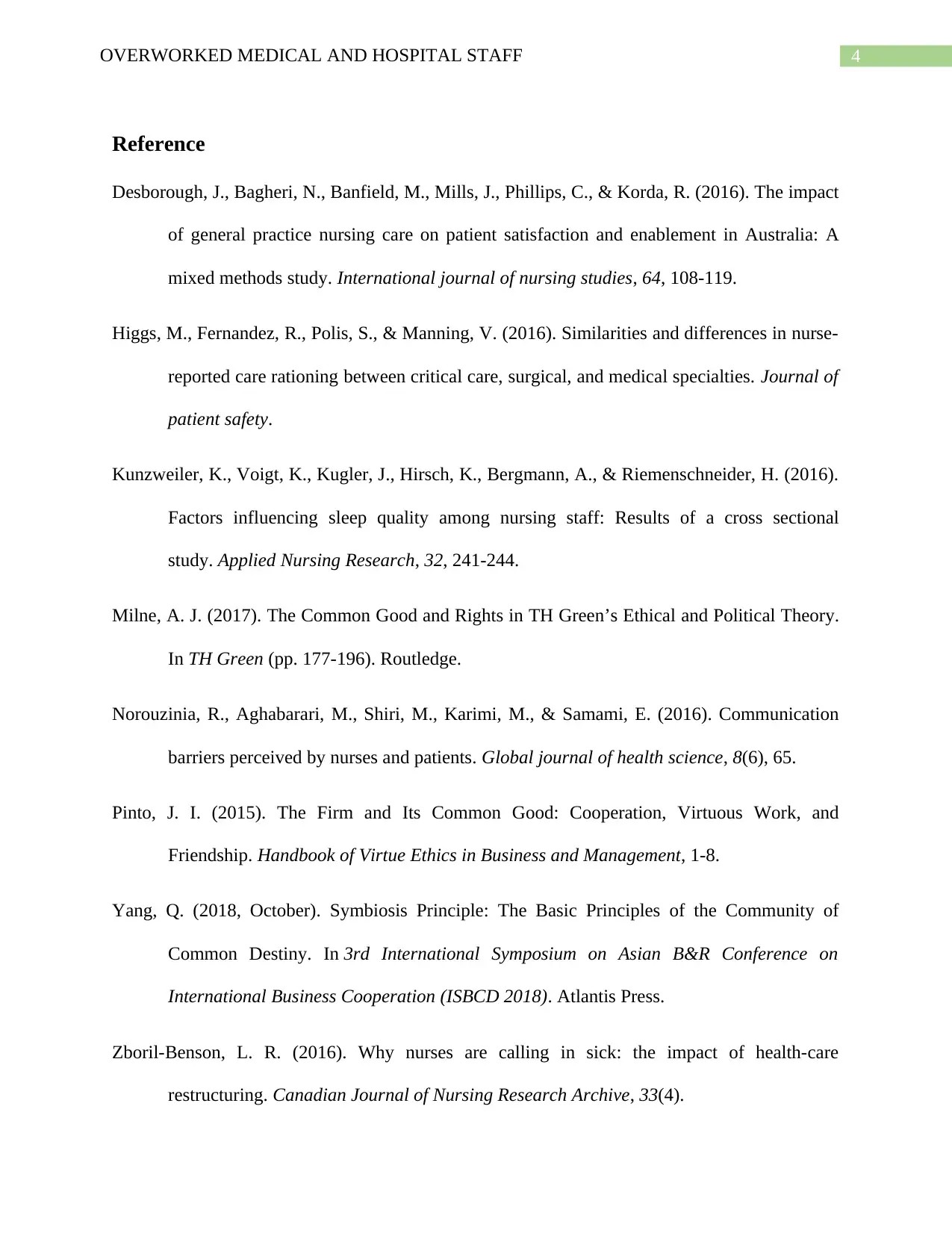
4OVERWORKED MEDICAL AND HOSPITAL STAFF
Reference
Desborough, J., Bagheri, N., Banfield, M., Mills, J., Phillips, C., & Korda, R. (2016). The impact
of general practice nursing care on patient satisfaction and enablement in Australia: A
mixed methods study. International journal of nursing studies, 64, 108-119.
Higgs, M., Fernandez, R., Polis, S., & Manning, V. (2016). Similarities and differences in nurse-
reported care rationing between critical care, surgical, and medical specialties. Journal of
patient safety.
Kunzweiler, K., Voigt, K., Kugler, J., Hirsch, K., Bergmann, A., & Riemenschneider, H. (2016).
Factors influencing sleep quality among nursing staff: Results of a cross sectional
study. Applied Nursing Research, 32, 241-244.
Milne, A. J. (2017). The Common Good and Rights in TH Green’s Ethical and Political Theory.
In TH Green (pp. 177-196). Routledge.
Norouzinia, R., Aghabarari, M., Shiri, M., Karimi, M., & Samami, E. (2016). Communication
barriers perceived by nurses and patients. Global journal of health science, 8(6), 65.
Pinto, J. I. (2015). The Firm and Its Common Good: Cooperation, Virtuous Work, and
Friendship. Handbook of Virtue Ethics in Business and Management, 1-8.
Yang, Q. (2018, October). Symbiosis Principle: The Basic Principles of the Community of
Common Destiny. In 3rd International Symposium on Asian B&R Conference on
International Business Cooperation (ISBCD 2018). Atlantis Press.
Zboril-Benson, L. R. (2016). Why nurses are calling in sick: the impact of health-care
restructuring. Canadian Journal of Nursing Research Archive, 33(4).
Reference
Desborough, J., Bagheri, N., Banfield, M., Mills, J., Phillips, C., & Korda, R. (2016). The impact
of general practice nursing care on patient satisfaction and enablement in Australia: A
mixed methods study. International journal of nursing studies, 64, 108-119.
Higgs, M., Fernandez, R., Polis, S., & Manning, V. (2016). Similarities and differences in nurse-
reported care rationing between critical care, surgical, and medical specialties. Journal of
patient safety.
Kunzweiler, K., Voigt, K., Kugler, J., Hirsch, K., Bergmann, A., & Riemenschneider, H. (2016).
Factors influencing sleep quality among nursing staff: Results of a cross sectional
study. Applied Nursing Research, 32, 241-244.
Milne, A. J. (2017). The Common Good and Rights in TH Green’s Ethical and Political Theory.
In TH Green (pp. 177-196). Routledge.
Norouzinia, R., Aghabarari, M., Shiri, M., Karimi, M., & Samami, E. (2016). Communication
barriers perceived by nurses and patients. Global journal of health science, 8(6), 65.
Pinto, J. I. (2015). The Firm and Its Common Good: Cooperation, Virtuous Work, and
Friendship. Handbook of Virtue Ethics in Business and Management, 1-8.
Yang, Q. (2018, October). Symbiosis Principle: The Basic Principles of the Community of
Common Destiny. In 3rd International Symposium on Asian B&R Conference on
International Business Cooperation (ISBCD 2018). Atlantis Press.
Zboril-Benson, L. R. (2016). Why nurses are calling in sick: the impact of health-care
restructuring. Canadian Journal of Nursing Research Archive, 33(4).
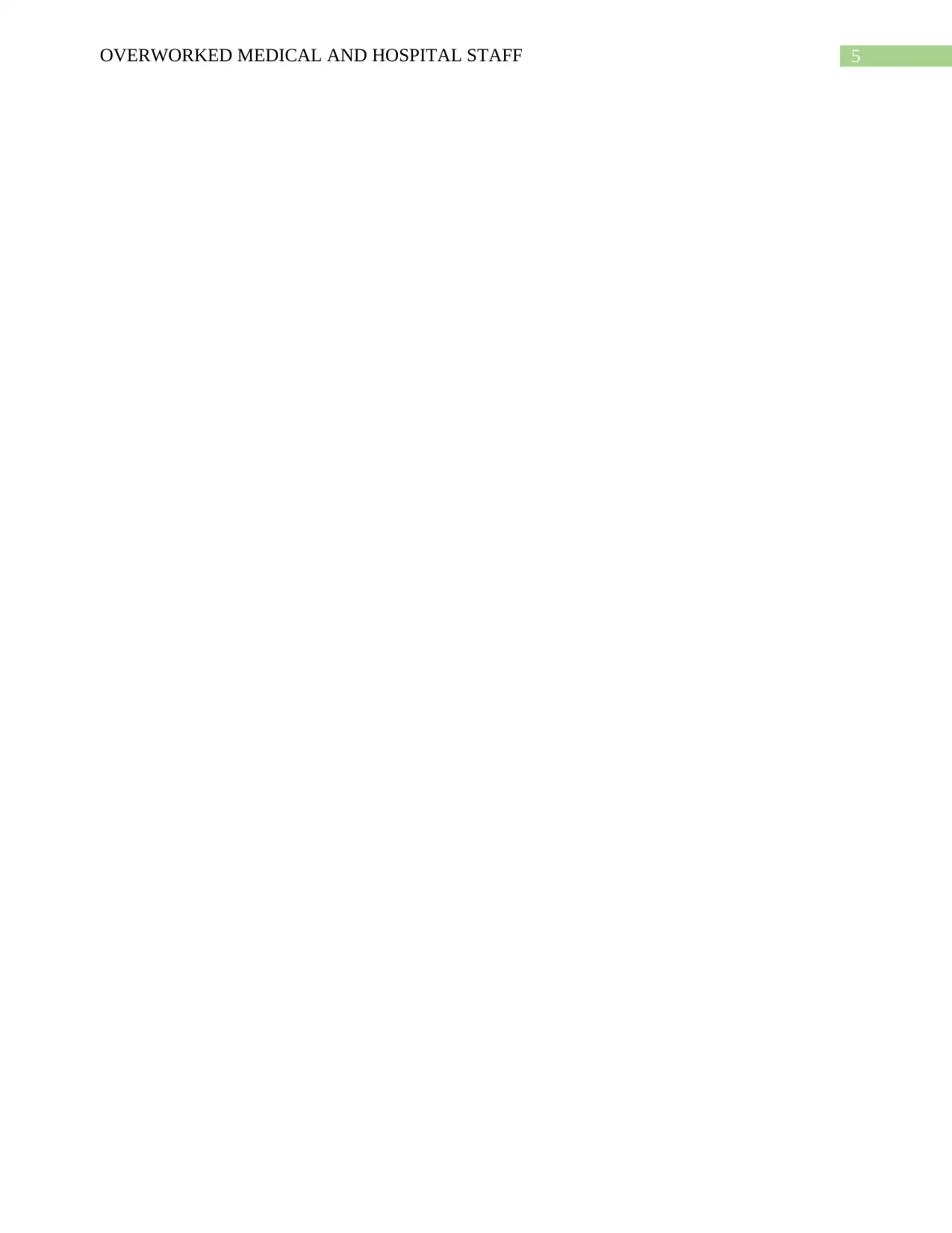
5OVERWORKED MEDICAL AND HOSPITAL STAFF
⊘ This is a preview!⊘
Do you want full access?
Subscribe today to unlock all pages.

Trusted by 1+ million students worldwide
1 out of 6
Related Documents
Your All-in-One AI-Powered Toolkit for Academic Success.
+13062052269
info@desklib.com
Available 24*7 on WhatsApp / Email
![[object Object]](/_next/static/media/star-bottom.7253800d.svg)
Unlock your academic potential
Copyright © 2020–2025 A2Z Services. All Rights Reserved. Developed and managed by ZUCOL.





